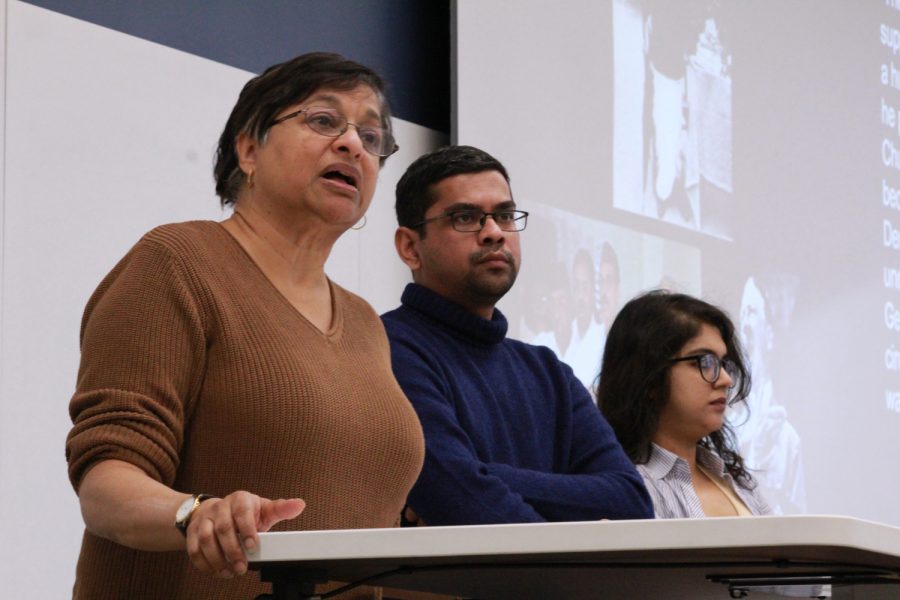Pittsburgh Against Fascism in India holds teach-in
Carolyn Pallof | Staff Photographer
The Pittsburgh Against Facism in India Teach-in was held on Friday in Posvar Hall to raise awareness of India’s current political state.
January 21, 2020
A group of students came to the front of a classroom and began to read.
“We, the people of India, having solemnly resolved … ”
The crowd is instructed to repeat this phrase, then the students continue.
“ … to constitute India into a Sovereign Socialist Secular Democratic Republic … ”
The call and response continues until all of the preamble to the Constitution of India is read fully aloud, together, by a classroom full of people.
The Pittsburgh Against Facism in India Teach-in took place in Posvar Hall on Friday from 3 to 6 p.m. The event — which was organized and hosted by faculty members and graduate students — was held to raise awareness and educate people on India’s current political state, including country-wide protests and recent attacks on universities.
According to Sritama Chatterjee — a graduate student in the English department and an organizer of Pittsburgh Against Fascism in India — about 200 people attended the event, which was split into three one-hour sessions.
During each session, organizers gave presentations on key issues such as the recent attack on Jawaharlal Nehru University, where more than 50 masked people attacked and injured 39 students and teachers. Members of left-wing organizations have accused right-wing and Hindu nationalist groups of orchestrating the attacks. Organizers also discussed the recently passed Citizenship Amendment Act — an act that will grant citizenship to immigrants of several religious minorities in India except for Muslims — and the protests that have emerged throughout the country as a result.
Kuhu Tanvir, a visiting lecturer in the English department, was in Delhi in December when the widespread protests broke out. She participated in some of the protests and shared pictures she took there at the teach-in.
“What has been really heartening about the protests in India at this point is that people have kind of seen through the communal nature of what the government is trying to do. To see people out on the street and being so aware of what the actual agenda [of CAA] is more than a silver lining,” Tanvir said.
Shreyas Vasudevan, senior economics and political science double major, gave a presentation on the spread of “fake news” via WhatsApp and a series of mob lynchings that have occurred due to the spread of misinformation on the app. Fake messages and crime accusations have targeted people in rural areas, chiefly in marginalized groups.
Organizers FaceTimed Daud Arif, a media practitioner, and Moushumi Bhowmik, a singer-songwriter and activist.
Bhowmik spoke about the current state of India and her experiences with the ongoing protests.
“It’s been an extreme situation, really. It’s almost like things were coming to this point, but we weren’t quite prepared for the huge upsurge that would happen over just a period of months,” Bhowmik said. “It’s both the state that is coming down very heavily on the people as well as people rising in protest and becoming very very resolute and resilient about their protests. It’s really the rise of fascism that we seem to be in the midst of.”
When asked what the spirit of the protests is currently like, she referenced Charles Dickens.
“It’s a bit like the ‘best of times and worst of times.’ In many ways this is really a beautiful time, since we keep meeting people on the street and sing on the street and march on the street. It’s a positive spirit, but we feel low at the same time,” she said.
Bhowmik also sang a portion of the “unsung anthem” of India — the extra verses of India’s national anthem — to much delight from the audience. According to Bhowmik, these extra verses have been “reclaimed” by protestors, as they feel they reflect and celebrate the diversity of India.
Manal Sayyed, a sophomore economics and psychology double major, first heard about the teach-in from a friend who discovered the event through an email the Pitt Prison Outreach club sent out. She was also interested in attending after reading a letter Pitt’s Student Government Board penned over winter break to the government of India showing solidarity with the CAA protestors.
“This was a very informative event. As someone who has heard only bits and pieces of what is going on in India to the minorities, it was very helpful to hear in-depth about the laws being put in place that discriminate against minorities, specifically Muslims,” she said.
Organizers led participants in various interactive activities, including the recitation of the preamble of India’s constitution, screen printing and sign-making for the Pittsburgh Against Facism in India protest that is set to take place on Sunday. Silpa Mukherjee — a Ph.D. candidate in the English department — and Chatterjee also led the teach-in in singing the Indian protest song “Hum Dekhenge.”
“The fact that we could Skype in speakers from India who are on the ground allowed the audience to hear about their experiences and ask them questions,” Chatterjee said. “The participatory components got the audience really involved.”
Mukherjee said audience interaction was a key element of the teach-in.
“We tried to keep a balance between information and interaction. The idea was also to spread awareness through the people actively protesting in India,” she said. “We [the organizers] also agreed on the importance of making our audience a part of the protest in some way — art-making, chanting and collective reading became a way forward.”








